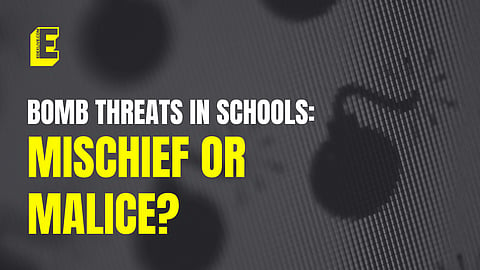

After several hoax bomb threats were issued to Central Reserve Police Forces (CRPF) schools in India, particularly in Delhi and Hyderabad via email on Monday, October 21, the Ministry of Home Affairs (MHA) issued an advisory to create a Special Wing of Cyber Commandos in all states.
This Special Wing would be tasked to assess and investigate cyber threats in India and aims to recruit over 5,000 Cyber Commandos, all of whom would be integrated into state police forces as a national reserve.
With this advisory, it is hoped that the menace of bomb threats issued to schools, airlines, and other organisations will be reduced.
Over the last year, bomb threats to schools have increased manifold, with 60 schools in the Delhi National Capital Region (NCR) being targeted by them in May 2024 alone.
In addition, 200 schools in Kolkata received threats of bombs being planted in their classrooms, with their effects described in chilling and graphic detail.
Most alarmingly, several schools in Ahmedabad were also targeted by these threats — just a day ahead of when Gujarat went to polls in the 2024 Lok Sabha Elections. These threats were traced back to a Russian server.
Fear among parents palpable
While most of them have later been confirmed to be hoaxes, bomb threats to schools are understandably leaving a lot of parents worried.
“It is concerning,” says Anubha Srivastava Sahai, Supreme Court Advocate and President of the India-Wide Parents’ Association.
“As a parent, I cannot take bomb threats lightly and dismiss them as false or a hoax. They can turn out to be true anytime,” she says.
Moreover, Anubha, who is also a child rights activist, describes children and schools as especially sensitive, as they can be targeted by anti-social actors to spread terror effectively.
“You look at any act of terror around the world, you find that children and schools are soft and easy targets. This is because children are defenceless and innocent, which makes them easy to target,” she says, adding that attacks or threats of attacks on children trigger wider panic and chaos.
She recalls the deadly 1996 Lajpat Nagar Market blasts, during which she was a youngster. “Despite the shock and fear, it was business as usual for us and we resumed visiting the market, as we knew that it would not happen again. However, this is not the case with schools — we start worrying that if one school is targeted, so will the rest of them,” she says.
“Schools are meant to be our children’s second homes; it is difficult to imagine them being unsafe for them,” she laments.
“Difficult to tell between genuine threats and mischief”
A big challenge to curbing bomb threat hoaxes is identifying them in the first place, say cybersecurity experts.
“False bomb threats have existed since time immemorial; they are not a new phenomenon at all,” says Srinivas Kodali, an independent data and cybersecurity researcher. He adds that until a thorough investigation is carried out, it is difficult to differentiate between bomb threats with genuine anti-social intent and bomb threats sent by mischief makers.
He alleges that senders of bomb threats, in most cases, have turned out to be students, who wanted to skip school for a day.
“If you compare the number of bomb threats sent to schools and the number of actual bomb blasts in schools, the ratio is pretty high,” he says, adding that bombings in schools have, so far, been a rarity.
Further, he alleges that people who send these threats disclose their IP addresses through VPNs or Virtual Private Networks, which makes it seem that the threats were sent from abroad.
“Even if threats were issued on social media, there is little that social media companies can do against them, apart from taking them down or flagging them,” he says, adding that the Central Government’s recent criticism towards X and Meta for “abetting” bomb hoaxes and not acting against them are misdirected.
However, there is a sign for relief, as the police and other law enforcement agencies take all bomb threats quite seriously. “We cannot stop mischief, but the government does respond to bomb threats with the necessary urgency,” he says,
What schools can do
While the Central Government is forming a reserve force of Cyber Commandos to combat bomb threats, schools should also stay equally vigilant against potential threats, says Ashish Naredi, Founder and Managing Director of INDIC International School, Hyderabad.
“Schools should develop emergency plans to combat any threat they receive, and collaborate with their local police and other law enforcement bodies to develop such plans,” he says.
Further, he adds that schools must also closely monitor who goes into and out of their campuses.
“On our school’s campus, we have solar fencing installed on the boundary walls and constant CCTV surveillance. We do not let anyone who is not a parent or relative of our students into the campus,” he says.
